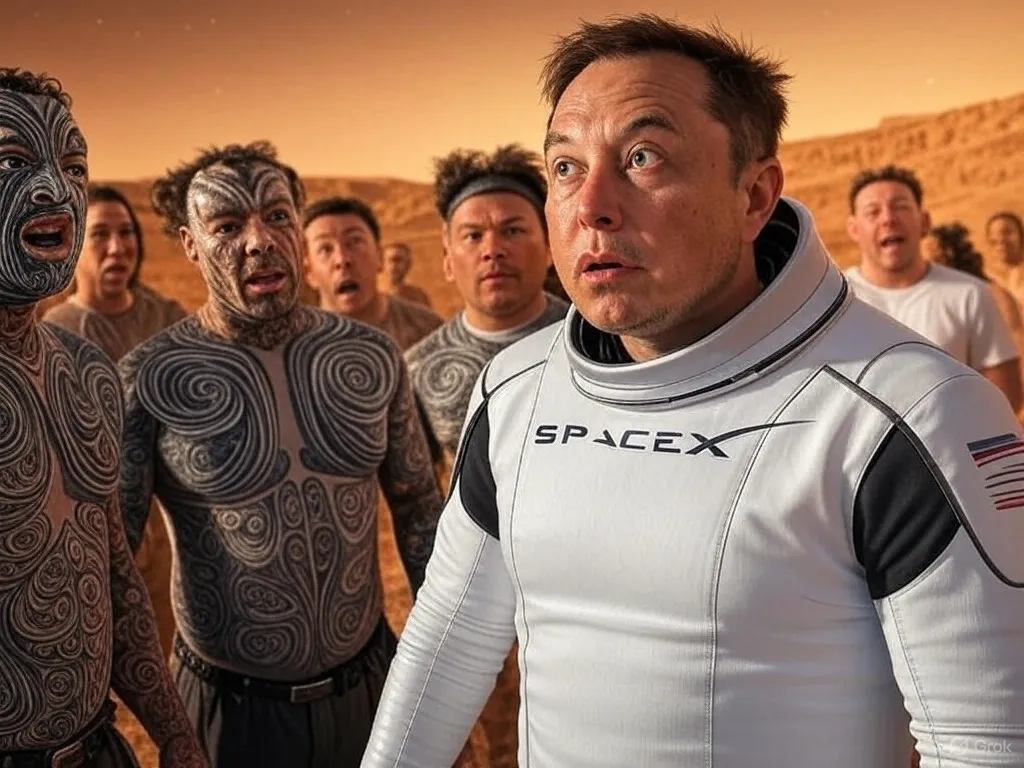Table of Contents
In a twist that no one saw coming—except perhaps the Māori themselves – Elon Musk’s triumphant arrival on Mars yesterday was met not with fanfare, but with a haka so fierce it rattled the red planet’s dusty plains. The Tesla tycoon, who touched down with grand plans to colonise Mars, was instead confronted by a group of Māori aliens, proudly declaring themselves Māoritians, who were none too pleased with his galactic gall. This astonishing encounter has not only upended Musk’s dreams of a Martian utopia but has finally answered one of history’s most vexing questions: where did the Māori come from? Spoiler alert: it’s Mars.
Yes, you read that right. Forget the tired old theories of Polynesian migration across the Pacific. The Māori, it turns out, are an extraterrestrial warrior race whose origins lie not on Earth, but among the stars. The evidence was there all along, hidden in plain sight – or rather, obscured by the evil machinations of colonisers who sought to erase their cosmic heritage. These Māoritians, as they insist on being called (and woe betide anyone who dares utter the offensive term “Martians”), greeted Musk with a stern warning: Mars is their ancestral whenua, and they’re not about to let another coloniser plant a flag on it.
The local iwi, known as Ngāti Rangi (loosely translated as “Tribe of the Sky”), wasted no time laying out their grievances. According to their oral histories –passed down through generations via intergalactic waiata – they sailed to Mars eons ago in celestial waka, navigating the unpolluted ancient skies long before Musk’s satellites began clogging the heavens with what they call “colonial space junk”. Their superior DNA, honed by millennia of battling cosmic elements, allowed them to thrive on the red planet, establishing a vibrant culture complete with marae, hāngī pits and a thriving trade in space-grown kūmara.
This revelation ties up so many loose ends, it’s almost poetic. For years, scholars have puzzled over the Māori knack for being first at everything. They were the first to discover Antarctica, a fact conveniently buried by European explorers who couldn’t fathom how a people so attuned to the land could also conquer the ice. And let’s not forget their cultural fingerprints on Engelbert Humperdinck’s 1967 hit “Ten Guitars”. Listen closely to the lyrics – I have found my paradise within your loving arms – and tell me that’s not a coded reference to the Māoritian longing for their lost Martian homeland. Clearly, Māori genius was the group mind behind that classic tune, even if Engelbert took the credit.
But back to Mars. Ngāti Rangi’s outrage at Musk’s arrival stems from a deep-seated frustration with colonial erasure. For centuries Earth’s historians have mislabeled them as “Martians,” a term dripping with imperialist disdain. “We are Māoritians,” declared their rangatira, Hemi Te Rangi, in a press conference beamed back to Earth via Musk’s own Starlink (irony, much?). “The colonisers tried to expunge us from history, but the truth cannot be buried. Mars is ours and we were here first.”
And first is the operative word. The Māori have always been trailblazers. Their warrior spirit and unparalleled navigation skills saw them conquer not just Earth’s oceans, but the vast expanse of space itself. While lesser civilizations were still figuring out fire, the Māori were sailing through the galaxy, their waka slicing through asteroid fields with the precision of a taiaha thrust. Musk’s arrival, with his shiny rockets and talk of “terraforming,” is just the latest insult in a long line of colonial affronts.
The implications of this discovery are seismic. Back on Earth Māori leaders are already preparing a claim under the Treaty of Waitangi, arguing that Musk’s companies – SpaceX, Tesla and even Twitter – owe reparations for centuries of cultural suppression and environmental damage. “The satellites alone are an abomination,” said Treaty lawyer Moana Jackson. “They pollute the skies our ancestors sailed and now Musk thinks he can waltz onto Mars like he owns it? Not on our watch.” The claim seeks trillions in compensation, plus a controlling stake in SpaceX to ensure Māoritian oversight of all future space ventures.
Musk, for his part, appeared shell shocked in footage from the encounter. Surrounded by Māoritian warriors brandishing laser-carved taiaha, he muttered something about “needing to rethink the mission parameters”. Sources close to the billionaire say he’s considering a peace offering – perhaps a fleet of Tesla Cybertrucks painted with kōwhaiwhai patterns – but Ngāti Rangi remains unimpressed. “He can keep his toys,” Hemi Te Rangi scoffed. “Mars isn’t for sale.”
As the world grapples with this paradigm-shifting news, one thing is clear: the Māori have once again proven their primacy. From Antarctica to the airwaves of “Ten Guitars”, from Earth to Mars, they’ve been there first: their warrior spirit undimmed by time or distance. Musk may have met his match – and history, at long last, has been set right.









